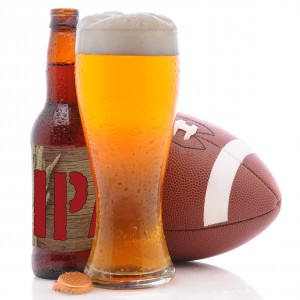 As the Super Bowl approaches, you may be thinking about beer: either deciding what to drink during the big game or wondering if a beer commercial will once again be the best ad. Beer companies are frequently noted for their creativity in naming and marketing their suds. This creativity has to be protected, however, and recent intellectual property disputes of all kinds have been brewing.
As the Super Bowl approaches, you may be thinking about beer: either deciding what to drink during the big game or wondering if a beer commercial will once again be the best ad. Beer companies are frequently noted for their creativity in naming and marketing their suds. This creativity has to be protected, however, and recent intellectual property disputes of all kinds have been brewing.
Exit 6
Exit 6 brewery set social media abuzz with their very public marketing dispute with Starbucks. The small St. Louis brewery had been serving a blended drink consisting of a splash of Founders Breakfast Stout in a glass of Exit 6’s own Vanilla crème ale. Exit 6 deemed the creation a “Frappicino,” after customers compared the combination to a Starbucks Frappuccino, the coffee giant’s trademarked blended coffee beverage. The brewery’s owner, Jeff Britton, explained the spelling difference was merely because they were “poor spelers.”
Starbucks did not see the humor in the drink’s name. After discovering customers drinking “Frappicinos” on the beer-centric app Untappd, the chain sent Britton a cease and desist letter. It claimed the name would cause dilution of the Starbucks brand and confusion among beer and coffee drinkers.
Britton responded with a $6 royalty check, based on the three beers that were logged on Untappd. He posted a sarcastic apology on Exit 6’s Facebook account, referring to his concoction as “the F word” throughout the letter:
[W]e meant no deception, confusion, or mistaking in the naming of the beer F Word. We never thought that our beer drinking customers would have thought the alcoholic beverage coming out of the tap would have actually been coffee from one of the many, many, many stores located a few blocks away. I guess that with there being a Starbucks on every corner in every block in every city that some people may think they could get a Starbucks at a local bar. So that was our mistake.
Exit 6’s creative response earned national media attention, fermenting free publicity from the would-be marketing dispute.
“Hold My Beer and Watch This”
Exit 6 was not the only brewer to end an IP conflict quickly. Anheuser Busch, America’s first national beer brand, recently settled a legal dispute arising from the online ad campaign, “Hold my beer and watch this.” The campaign featured a series of videos where characters ask someone to hold their beer before doing something amazing or unusual, like a grandmother faking her own death.
The video stunts did not impress Montana-based Big Sky Brewing Company, which claimed that it featured that exact phrase on the can of its IPAs since 2004, and that it trademarked its use in 2009. Following a cease and desist letter, Big Sky filed suit for trademark infringement in December of last year, seeking to permanently enjoin Anheuser Busch from using the phrase, as well as disgorgement of profits. Anheuser Busch contended that the phrase was too common to be protected by trademark. However, the InBev-owned brewery took down the contested videos from its YouTube page, and Big Sky dropped its suit, ending the month-long litigation.
The case was Big Sky Brewing Co. v. Anheuser-Busch LLC, No. 9: 13-cv-00307-DWM (D. Mon. 2013).
Other Disputes
These beverage producers were able to quickly resolve these conflicts. Other trademark disputes can be protracted, as with Anheuser Busch’s more than century-long dispute with a Czech brewery over the Budweiser name. Parties can also avoid litigation with compromise, as Avery Brewing and Russian River Brewing did. The two alehouses each created a Belgian-style ale named Salvation. Instead of duking it out in court or forcing one to drop the name, the two decided to combine the beers and formed a “Collaboration, Not Litigation” ale with the best qualities of each.
The craft beer business is quickly growing in the United States, where the market for “small, independent, traditional” breweries expanded over fifteen percent from 2012-2013. Increasingly, traditionally smaller craft breweries are selling their suds in multiple states. With this influx of business and expanding interstate reach, breweries will inevitably repeat names, tag lines, and marketing efforts, if not always intentionally. These cases underscore the importance of vigilant brand protection for manufacturers of all sizes. Cozen O’Connor’s Intellectual Property Department will monitor and report on developments in these kinds of actions.

